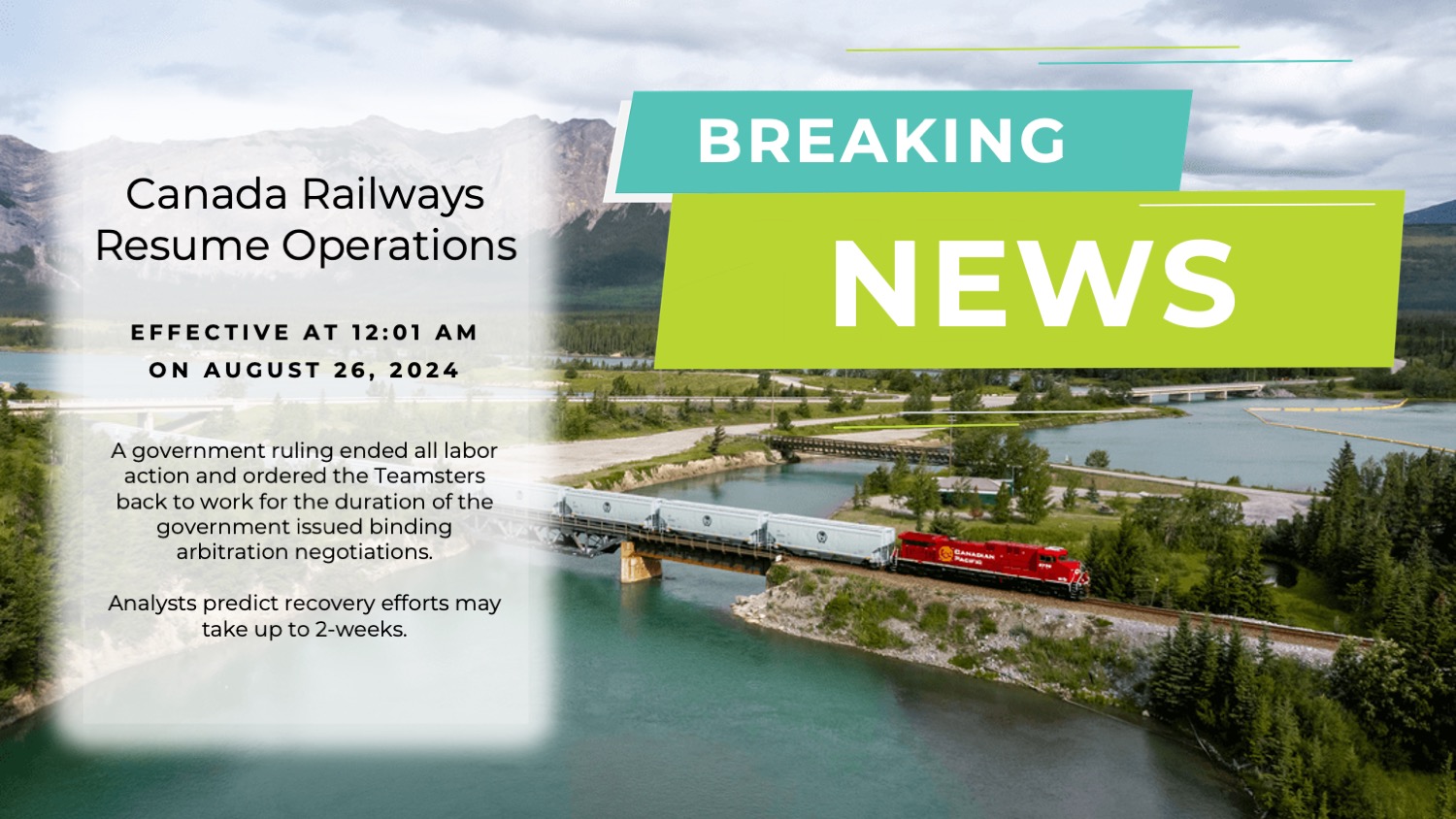UPDATE: MONDAY, AUGUST 26, 2024 – WORK RESUMES AT CANADIAN RAILWAYS
Effective at 12:01 AM today, August 26, 2024, work has resumed at both CN and CPKC. This work resumption is the result of the Canada Industrial Relations Board order published on Saturday, August 24, 2024 that ruled the Teamsters back to work for the duration of the collective bargaining arbitration process.
TCRC responded by stating that “the union will lawfully comply with the CIRB decision. The Teamsters will also appeal the ruling to federal court.”
CN indicated that they “will comply with the order which also extends the current collective agreement until a new agreement is signed between the parties.”
CPKC stated the company will comply with the CIRB decision and resume work, “[the] team is executing its restart plan for the safe and orderly resumption of rail service across Canada. We are working with customers on a balanced return to normal operations.”
Analysts predict it will take a couple of weeks for the railways to work through their backlog and return to normal operations.
CANADA RAIL CRISIS: GOVERNMENT INTERVENES
Effective at 4:30 PM on August 22, 2024, Canada’s Minster of Labour invoked the Canada Labour Code to direct the Canada Industrial Relations Board to assist the Canadian National Railway Company (CN) and Canadian Pacific Kansas City (CPKC) announced the labor lockout earlier this week citing failed contract negotiations with the Teamsters Canada Rail Conference (TCRC) in settling their collective bargaining agreements.
“Canada is a trading nation. The government will do everything in its power to preserve the stability and certainty that our railways – and entire economy – are renowned for the world over.”
Steven MacKinnon | Canada Minister of Labour
CANADA RAIL OPERATIONS: SITUATION REMAINS FLUID
In response to the government’s imposition of binding arbitration and order to return to work, TCRC issued a notice to strike to CN effective August 26, 2024 and appealed the constitutionality of the government’s involvement in the labor contract negotiations with CPKC.
Teamsters returned to work at CN on Friday, August 23, 2024. Work remains halted at CPKC pending an order from the Canada Industrial Relations Board (CIRB).
CANADA-BOUND FREIGHT DIVERTED TO U.S. PORTS
During the 22-hour lockout, some cargo was diverted to U.S. ports. In response to the Canada rail crisis, U.S. Customs and Border Protection (CBP) hosted a call for industry stakeholders to answer questions about the impact on U.S. trade. Susan Thomas, CBP’s Executive Director of Cargo and Conveyance Security noted, “some of the ports of entry have already seen some upticks in numbers” from cargo diverted from Canadian ports to U.S. ports. CBP officials reported that they have started observing a shift in trade patterns, with vessels originally bound for Canada now being redirected to U.S. ports. From there, the goods may be transported across the border by truck or other means.
“If those numbers are going to grow, and you know that based on your specific supply chain, then it is helpful to give those ports of entry a heads-up.”
Susan Thomas | CBP | Executive Director of Cargo and Conveyance Security
U.S. CBP RECOMMENDS A PROACTIVE APPROACH TO CARGO DIVERSIONS
CBP recommends importers and exporters using all modes of transportation communicate with U.S. ports regarding cargo originally destined for Canada to ensure bills of lading that have not been manifested as U.S. cargo may be addressed before the diverted cargo reaches a U.S. port. This recommendation will enable shippers to comply with diversion regulations while giving U.S. ports notice that diverted cargo is heading their way so the port can prepare to receive it. While U.S. ports will employ flexibility for diverted cargo the cargo must comply with U.S. regulations for imports and exports. Partner governing agencies such as the FDA and USDA regulations must also be complied with should the cargo fall under their import/export governance.
Thomson also indicated that “a lot of product that is in Mexico needs to transit the U.S. to get to Canada as well. Those that can shift to other modes are preparing to do so or have already begun to do so, especially since we don’t know how long this is going to last.”
Stay up-to-date on freight news with Green’s Weekly Freight Market Update by following us on LinkedIn. For continuous updates, make sure to check out our website at greenworldwide.com.






